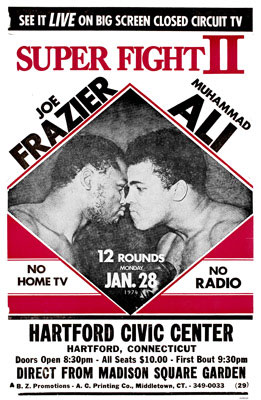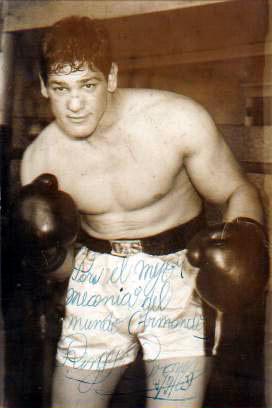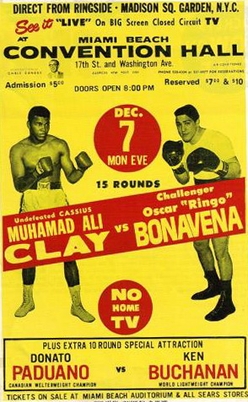
Muhammad Ali vs. Joe Frazier lll, billed as the "Thrilla in Manila", was the third and final boxing match between undisputed champion Muhammad Ali, and former champion Joe Frazier, for the heavyweight championship of the world. The bout was conceded after fourteen rounds on October 1, 1975, at the Araneta Coliseum in Cubao, Quezon City, Philippines, located in Metro Manila. The venue was temporarily renamed the "Philippine Coliseum" for this match. Ali won by corner retirement (RTD) after Frazier's chief second, Eddie Futch, asked the referee to stop the fight after the 14th round. The contest's name is derived from Ali's rhyming boast that the fight would be "a killa and a thrilla and a chilla, when I get that gorilla in Manila."

George Edward Foreman is an American former professional boxer, entrepreneur, minister, and author. In boxing, he competed between 1967 and 1997 and was nicknamed "Big George". He is a two-time world heavyweight champion and an Olympic gold medalist. As an entrepreneur, he is known for the George Foreman Grill.

Joseph William Frazier, nicknamed "Smokin' Joe", was an American professional boxer who competed from 1965 to 1981. Widely regarded as one of the greatest heavyweight boxers of all time, he was known for his strength, durability, formidable left hand, and relentless pressure fighting style and was the first boxer to defeat Muhammad Ali. Frazier won a gold medal at the 1964 Summer Olympics as an amateur, held the NYSAC heavyweight title from 1968 to 1973, and was the undisputed heavyweight champion from 1970 to 1973.

Joe Frazier vs. Muhammad Ali, billed as The Fight of the Century or simply The Fight, was a heavyweight championship boxing match between WBA, WBC, and The Ring heavyweight champion Joe Frazier and former undisputed heavyweight champion of the world Muhammad Ali, on Monday, March 8, 1971, at Madison Square Garden in New York City.

Angelo Dundee was an American boxing trainer and cornerman. Internationally known for his work with Muhammad Ali (1960–1981), he also worked with 15 other world boxing champions, including Sugar Ray Leonard, Sean Mannion, José Nápoles, George Foreman, George Scott, Jimmy Ellis, Carmen Basilio, Luis Manuel Rodríguez, and Willie Pastrano.

Muhammad Ali vs. Joe Frazier II, billed as Super Fight II, was a professional boxing match contested on, for the NABF heavyweight title. The second of the three Ali–Frazier bouts, it took place at Madison Square Garden in New York City on Monday, January 28, 1974.

Oscar Natalio "Ringo" Bonavena was an Argentine heavyweight professional boxer with a career record of 58 wins, 9 losses and 1 draw. A rugged, wild-swinging puncher, he was nicknamed "Ringo" because of his Beatles haircut, and enjoyed professional success in both Argentina and the United States. He is remembered for giving Joe Frazier and Muhammad Ali hard fought bouts.
Leotis Martin was an American boxer, the first ever NABF heavyweight champion. Martin is best known for his victory over former-undisputed heavyweight champion Sonny Liston. A good puncher and fairly skilled heavyweight, he compiled a record of 31 wins and 5 losses from 1962 to 1969. Outside of Liston, he also won against top contenders Alvin Lewis, Karl Mildenberger, Thad Spencer, Sonny Banks, and Roberto Davila, and was listed by The Ring as one of the 100 greatest punchers of all time. His career, however, was marked by inconsistency and bad luck.
Muhammad Ali and Henry Cooper fought two boxing matches with each other in London. Their first match took place on 18 June 1963 and the second on 21 May 1966. Ali won both matches. The first fight was stopped by the referee in the fifth round, and the second in the sixth round. Both fights were stopped after Cooper started bleeding excessively from a cut to the left eye. The first Ali-Cooper bout is remembered for being one of the four fights in which Ali was officially knocked down in the ring by his boxing opponent, as well as leading to the mandate that ringside handlers always have an extra pair of boxing gloves available.

Muhammad Ali fought three professional boxing matches against Ken Norton between 1973 and 1976. Ali won the series 2–1, though the final fight was highly controversial.
Muhammad Ali and Joe Bugner fought two boxing matches with each other. Their first bout took place on February 14, 1973; and the second for the world’s heavyweight championship on July 1, 1975. Ali won both matches through unanimous decisions on points.
Muhammad Ali and Richard Dunn fought a boxing match on May 24, 1976. Ali won the bout by knocking out Dunn in the fifth round. The fight is remembered for being the last time Ali would knock down any opponent in the ring in his boxing career.
Heavyweight boxers Muhammad Ali and Bob Foster fought on November 21, 1972, in Stateline, Nevada. Ali won the bout by knocking out Foster in the eighth round. Ali knocked Foster down seven times and this was the only fight in which Ali ever suffered a cut. The bout was notable because it was one of the first boxing matches refereed by Mills Lane.
Cassius Clay fought Argentine Alex Miteff in a ten-round boxing match in Louisville on October 7, 1961. Clay won the fight through a technical knockout when the referee stopped the fight in the sixth round. Miteff and Clay would feature in the 1962 film Requiem for a Heavyweight.
The Cassius Clay vs. Alonzo Johnson ten-round boxing match between Cassius Clay and Alonzo Johnson was held in Louisville, Kentucky on July 22, 1961. Cassius Clay won the bout on points with a unanimous decision.
Cassius Clay fought an eight-round boxing match with LaMar Clark in Louisville on April 19, 1961. Clark had entered the ring with a formidable reputation of knocking out 45 of his previous opponents. However, Clay broke Clark's nose in the fight and won the bout through a knockout in the second round following which Clark retired from boxing.
Cassius Clay fought a ten-round boxing match with Willi Besmanoff in Louisville on November 29, 1961. Clay won the bout through a technical knockout in the seventh round after the referee stopped the fight with Besmanoff sprawled on his back on the canvas.

Cassius Clay fought an eight-round boxing match with Texan Donnie Fleeman in Miami on February 21, 1961. Prior to this fight, Fleeman had a record of 51 fights with 45 wins including 20 knockouts. Clay won the bout through a technical knockout after the referee stopped the fight in the seventh round. This was the first time Clay had gone over six rounds in a boxing match. It was also the first time Fleeman had ever been knocked down in a boxing match. Fleeman retired from boxing after this fight.
Cassius Clay fought a boxing match with Herb Siler in Miami on December 27, 1960. Clay won the bout through a technical knockout after the referee stopped the fight in the fourth round. The fight had taken place soon after Clay had joined the 5th Street Gym.

Muhammad Ali was a boxer who mastered the rope-a-dope fighting technique. He is widely regarded by many boxing commentators and historians as the greatest heavyweight boxer of all time. Boxing magazine The Ring named him number one in a 1998 ranking of greatest heavyweights from all eras. In 1999, The Associated Press voted Ali the number one heavyweight of the 20th century.










